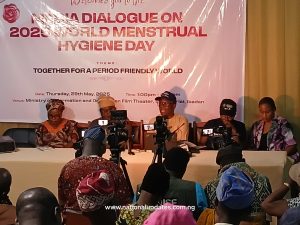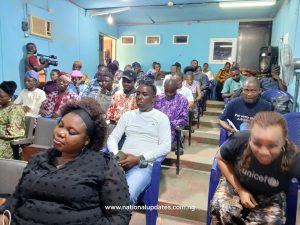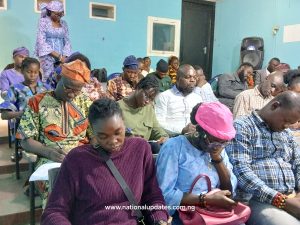In commemoration of the 2025 Menstrual Hygiene Day, the United Nations Children’s Fund (UNICEF), in collaboration with the Oyo State Government, has called for intensified public education to address harmful myths, stigma, and misinformation surrounding menstruation, particularly among adolescents and rural communities.



The call was made during a Media Dialogue held on Thursday at the Oyo State Ministry of Information and Orientation, Ibadan. The event brought together media practitioners and key stakeholders to highlight the importance of menstrual hygiene management as a critical factor in promoting girls’ health, dignity, and uninterrupted access to education.


Speaking at the event, UNICEF’s Social and Behaviour Change Specialist, Mrs. Aderonke Akinola-Akinwole, emphasized the urgent need for support from policymakers, opinion leaders, parents, government agencies, and civil society to create a safe and enabling environment for girls to manage their menstruation with dignity especially in schools.
She noted that the lack of access to clean water, basic hygiene, and proper sanitation facilities has contributed to the health challenges and in some cases, deaths of young girls across the state.
“Girls should never feel ashamed during their periods. They should be celebrated as contributors to the continuity of humanity,” she said.
Akinola-Akinwole urged all stakeholders to break the silence around menstruation by promoting access to menstrual hygiene products, dispelling harmful cultural myths, and incorporating menstrual hygiene education into school curricula.
She also called on men to actively speak against stigmatization and to support girls during menstruation, encouraging a more inclusive and respectful society.
“Media advocacy is crucial in addressing period poverty,” she said. “We need to ensure schools provide accurate education and safe spaces for girls, while also reaching traditional communities that still enforce restrictive practices against menstruating girls.”
UNICEF’s Water, Sanitation, and Hygiene (WASH) Specialist, Mr. Monday Johnson, also spoke at the event, reiterating the importance of appropriate menstrual awareness programs in schools.
He emphasized that widespread education and the involvement of the media, government ministries, and stakeholders are key to dispelling entrenched myths.
“Menstrual hygiene is a fundamental right,” Johnson said. “Our girls should never be held back because of their periods. That is why UNICEF, in partnership with the Oyo State Government, is committed to increasing awareness and promoting better hygiene standards.”
He further urged manufacturers to make sanitary products more affordable and accessible for girls, especially in low-income and underserved communities.
In his opening remarks, the Oyo State Commissioner for Information and Orientation, Prince Dotun Oyelade appreciated UNICEF’s long-standing partnership with the state spanning over three decades.
He reaffirmed the government’s commitment to supporting initiatives that advance the well-being of girls and promote public health through strategic development partnerships.
Menstrual Hygiene Day, observed globally on May 28, serves as a platform to promote awareness and encourage actions that ensure girls and women can manage menstruation safely and with dignity.

